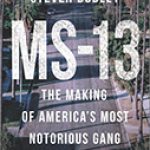Legacy: Gangsters, Corruption and the London Olympics

Author: Michael Gillard
Publisher: Bloomsbury, 2021. 384 pages.
Reviewer: Declan Hill ǀ March 2022
As the 2012 London Olympics were about to begin their Closing Ceremonies, a bank of black, toxic smoke drifted over East London. A fire in a nearby factory, owned by the central character of Legacy, gushed out a cloud of darkness perilously close to the multi-billion pound stadium, filled with athletes, music stars and seventy-thousand people. It is an apt metaphor for the price paid by and for the London Olympics: show-biz glitz and glamour hiding a very seedy world of corruption and organized crime.
Legacy is a brilliantly detailed and researched guide into the world that the Olympics concealed.
Michael Gillard, its author, is an award-winning journalist who has shown courage, dedication and talent in revealing the seamy English criminal world.
In our contemporary era, much of English media – as are their American counterparts – are focused on the minutiae of Downing Street or the White House. Legacy reveals the real England. It rips off the cover of the repressive class-system to show how the society actually functions with its many alliances between overworld politicians and business leaders and their organized crime counterparts.
Note, this is an ’English’ not ‘British’ world. Legacy is set in east London. It is a society made famous by television shows like ‘EastEnders’, ‘Call the Midwife’ or for any reader of Charles Dickens. The East End is the poor dock areas devastated in the Second World War by the Luftwaffe blitz. Now, after successive waves of immigration, it is a region populated with South Asian and Eastern European immigrants who mingle with the native Cockneys.
The stories revealed in Legacy challenge and trouble a reader on almost every conceivable level:
The connections between the U.K. porn world, sexual massage parlours and the top soccer world of the English Premier League.
The major international banks who lent tens-of-millions of pounds to a man named in a U.K. High Court as a ‘mobster’.
The politicians – both Labour and Conservative (the very rough equivalent of the Democrats and Republicans) – who connived with criminals to ensure that there were no media controversies around the London Olympics.
The covert power and influence of the Freemasons within English law enforcement.
The Muslim police officer who lied to his colleagues about taking ‘sick leave’. He was actually tracking down his teenage niece who had run off with her boyfriend. The next week, she was murdered by his brother for ‘dishonouring’ the family. He returned to the force, without punishment, and destroyed two high-profile investigations against organized crime groups.
The racism and corruption of the local East End politicians who mouth cliches in public while in private are more intent on staying in power by creating vote blocks than by actually helping their constituants.
In all, the book reads like a more truthful version of a Guy Ritchie film.
There is Billy ‘the Liar’ Allen, feared and loathed in the underworld for alleging killing his mother and father to fund his criminal activities.
There is the Jewish leader of the ‘Syndicate’ – Bernie Silver – who allied himself with the Maltese gangs to rule the sexual world of Soho.
There is the long torture session, caught on a police wire, of a man suspected of being a rat by East End cockney gangsters.
And there is violence, lots of violence: there is the punch up at the funeral; the punch up in the halls of the court room’ and the punch up of the tabloid journalist who ‘doorstops’ a mobster.
The essential story, however, is set in the tight, internecine world of the English organized crime families. Their gradual expansion into the globalized world and, of course, the arrival of the ferocious Albanians. It focuses on ‘Long Fella,’ a teenage criminal who with fearsome dedication – unlike much of the East End, he is a resolute non-drinker – rises to being a multi-millionaire with a country estate and international business dealings.
Along the way, Long Fella is helped by a series of people and institutions who should have prevented him doing what he was doing. Throughout Legacy is the allegation that someone, somewhere in law enforcement, was providing Long Fella with inside information and police protection. The financial world of England is revealed to be open to business with virtually anyone who has money (a number of books by Gillard’s colleagues have shown the effect of Russian mobsters and oligarchs on the London real estate market).
For academics, there are clear lessons amidst these colourful stories. For example, using Diego Gambetta’s analysis of protection as a commodity, a reader can understand the struggle for a monopoly of violence in a particular territory. In the early days of his rise, Long Fella and his group offered ‘security’ to pubs and restaurants in the East End. Rival outfits competed to offer similar deals to these institutions. The author shows that the winner was the man/side who was going to be the most irrationally violent. In one telling example of many, a builder remarks to Long Fella that he seems more peaceful now that he is living in a country estate. According to Gillard, Long Fella stops the car, takes out the man and beats him senseless.
Does the book have a problem? Yes. It is a book in search of an editor. For all its insights and lessons, you want to dip into it, rather than read it as one literary narrative. This problem comes because Gillard is such a good journalist that he does not want to leave out any of his stories, no matter how distracting to the plot. That said, this is a small gripe about an overall superb work. For anyone interested in English organized crime – read this book.
Declan Hill is an Associate Professor of Investigations at the Henry C. Lee College of Criminology and Forensic Science, University of New Haven, New Haven, Connecticut


